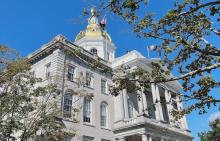Yesterday was “Session Day” at the State House. What that entails is proposed legislation is brought before the House of Representatives to be voted on or to be “killed” outright (inexpedient to legislate, ITL). Some bills, after passage, go on to either other committees for more work or to the Senate for them to work on, possibly amend. If that happens, the amended bills come back to the House for another vote. Should the Senate pass a bill without making any changes, the bill goes straight to the Governor.
We had 32 bills to vote on yesterday, one being HB 682 sponsored by Liberty Alliance and Young Americans for Liberty (YAL) member Rep. Michael Harrington R-Strafford. The purpose of this bill is to:
I. Remove the office of offshore wind industry development from the office of energy innovation.
II. Repeal the offshore wind industry workforce training center committee and the offshore and port development commission.
III. Move the grid modernization advisory council and the hydrogen advisory council to the office of energy innovation.
Well, there goes more jobs in the renewables field and clean energy planning. Also, now electricity costs may rise due to possible increase in dependence. Republicans: 204 – Democrats: 163
This is my absolute all-time favorite of the day! HB 368 is a bill sponsored by Rep. Peter Schmidt D-Dover, that was meant to prohibit smoking and e-cigarettes in motor vehicles when a passenger is under 16 years old. Here were the stated pro’s and the con’s:
Pro’s: young children are still developing, deserve a safe and healthy environment even from second-hand smoke. That exposure can cause life-long respiratory damage and other health issues.
Con’s: this is an infringement on the rights of drivers and/or other smoking adults in the vehicle. They don’t want to see government being able to tell people what they can and cannot do in their own vehicles.
The bill was “killed” by Republicans: 213 – Democrats: 157
Of course, if you are a female of child bearing age, that thought process goes right out the window! They are happy to have the government crawling all over YOUR rights and womb, telling YOU what you can and cannot do! But once that fetus is born, all bets are off. You and your kid are on your own. Need a good paying job? What? $7.25 an hour isn’t enough? Need affordable housing? Not on a $7.25 an hour income. These lawmakers won’t even pass a bill to allow free or reduced school lunches for low-income families.
Yesterday, NH Life Sciences was presenting a brief program in the cafeteria during the lunch hour. Included was a free lunch. You see where this is going, the lines were out BOTH cafeteria doors with representatives waiting to get their free lunch. I wonder how many of these hypocrits have voted time and time again to deny the same thing to children of low-income households?
Now I’ll end with a “win some.” HB 75 is a proposal to legalize cannabis for people 21 and older. Shockingly it is sponsored by Liberty Alliance and YAL member Rep. Kevin Verville R-Deerfield. The pro’s were that this is accessible in all other states surrounding NH, so let’s partake of that lost revenue. It would also allow for anyone convicted of or serving time for any cannabis-related offense to have their conviction or sentence annulled when the law goes into effect. Con’s: none other than “do the bill right” by voting against it.
The bill passed with 190 votes against Inexpedient to Legislate (killing the bill), with 167 votes in favor of killing the bill. The governor has said she will veto any such legislation, but we take our “wins” where we can!










